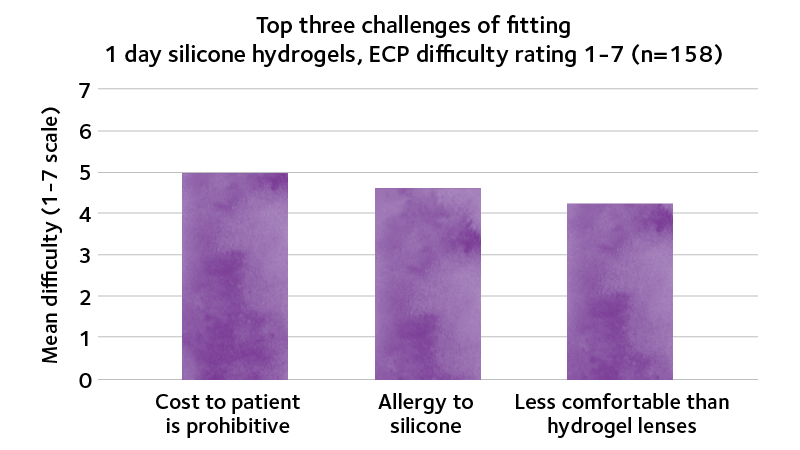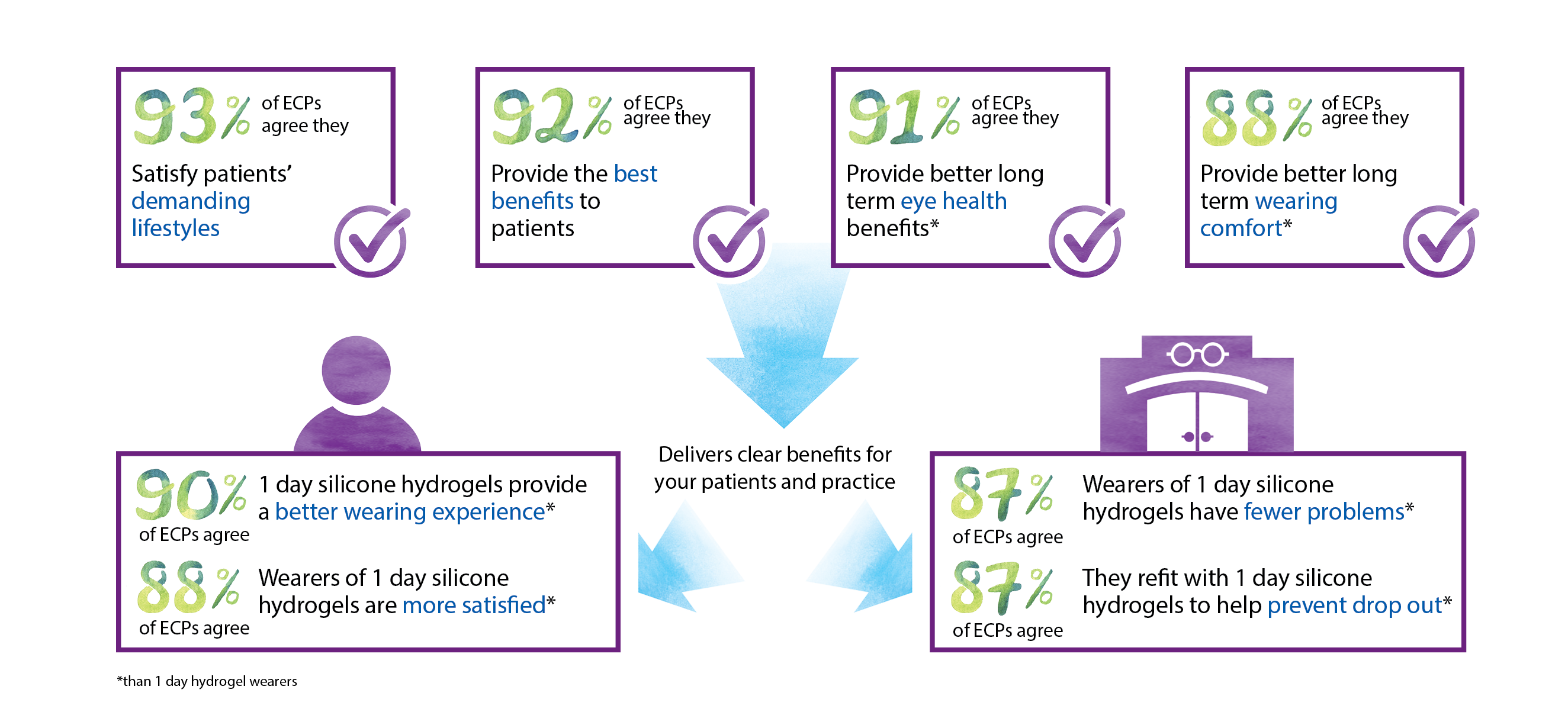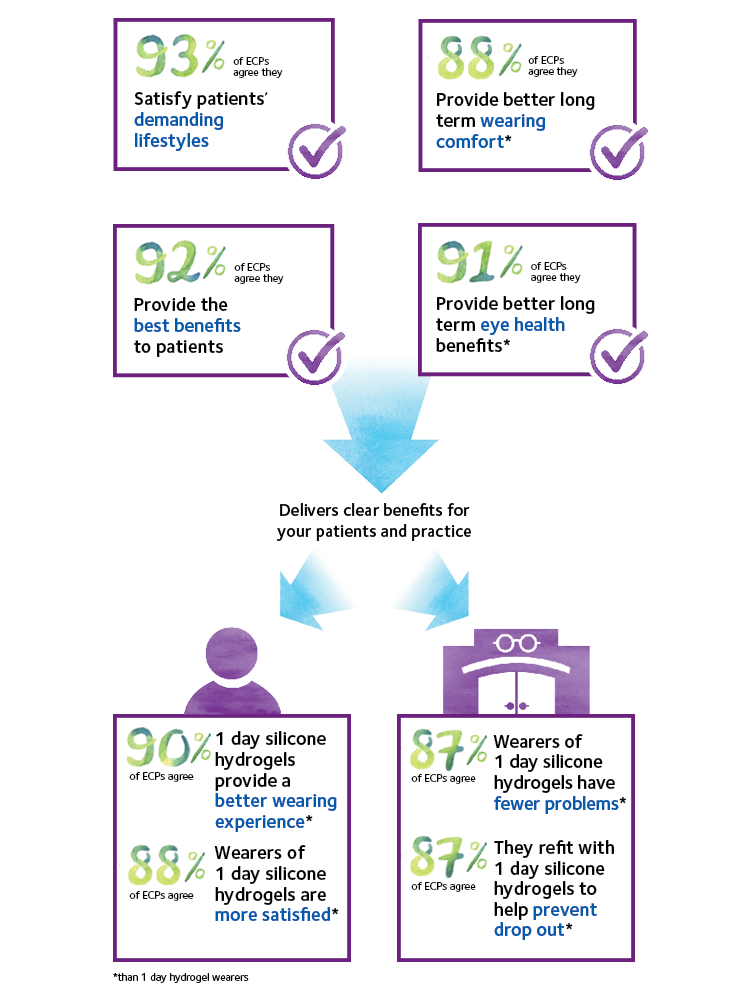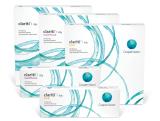Overview of 1 day silicone hydrogel global studies
1 day silicone hydrogel contact lenses have been available for around ten years, yet only half (52%) of the daily disposable fits recorded in the 2017 international prescribing report used silicone hydrogel materials.1 The health benefits of silicone hydrogels are widely recognised, and when questioned nine out of ten eye care professionals (ECPs) agree they are the healthiest option for their daily disposable patients.2 Why then is there a difference between what ECPs believe and what they prescribe? And thinking about contact lens wearers, do these fitting patterns align with what the patient wants?
A series of global studies by CooperVision involving both ECPs and consumers has explored this area. Conducted in the United States, United Kingdom and Japan, more than 450 ECPs and 1,500 consumers were surveyed to better understand their attitudes towards 1 day silicone hydrogel contact lenses.2-4
The results shed new light on ECPs’ opinions of 1 day silicone hydrogel contact lenses, and the beliefs they hold which affect their fitting habits. Insights from consumers about the expectations they have of their ECP, along with how they feel about silicone hydrogel contact lenses were also established. When the insights from both the ECP and consumer are brought together it highlights a gap between what the patient wants and what is often prescribed in practice.
This report summarises the key findings from the studies, examines the rationale for current fitting habits and suggests approaches that could be employed in practice to help bridge the gap between the ECP and patient.
Eye care professionals in broad agreement about the health benefits of 1 day silicone hydrogels
![]() agree that 1 day silicone hydrogel lenses are the best choice to safeguard patient eye health related to contact lens wear.2
agree that 1 day silicone hydrogel lenses are the best choice to safeguard patient eye health related to contact lens wear.2
![]() feel that silicone hydrogels should be the first choice of material for daily disposable lenses.3
feel that silicone hydrogels should be the first choice of material for daily disposable lenses.3
![]() of ECPs sometimes worry that their 1 day hydrogel lens wearers are not getting all the oxygen they require.2
of ECPs sometimes worry that their 1 day hydrogel lens wearers are not getting all the oxygen they require.2
Eye care professionals in broad agreement about the challenges of fitting 1 day silicone hydrogels
The same barriers to fitting 1 day silicone hydrogels were consistently reported by all three countries that were surveyed.
The most common concern related to cost followed by silicone allergy and comfort. Despite cost being highlighted most often, all three reasons were ranked by ECPs as similarly difficult to overcome.

Perceived cost barrier:
|
Almost all ECPs (95%) agree that if cost were equivalent they would choose silicone hydrogels over hydrogels for their daily disposable patients.2 Clearly, it seems ECPs often feel prevented from making this recommendation out of concern for the patient’s budget.
However over two-thirds (68%) of consumers say they expect their ECP—regardless of cost—to recommend a soft contact lens that provides 100% of the oxygen their eyes need.4
Furthermore, three-quarters of consumers would be likely to follow the advice of their ECP, again regardless of cost.4
There is a desire among patients to hear about the healthiest option. It appears the ECP has greater freedom than they realise to recommend their preferred contact lens.
Silicone ‘allergy’ barrier:
|
Of those surveyed, just 43% of ECPs currently agree there is no such thing as an allergy to silicone.2, This means more than half of ECPs believe silicone allergy is possible.
A recent publication reviewed the etiology of allergic response, concluding that silicone has none of the properties that would elicit a true allergic response.5.
While silicone allergy is not biologically possible,6 there are ocular responses, such as contact lens induced papillary conjunctivitis, that may mimic some of the signs and symptoms of allergic eye disease. Where a patient does not get on well with a silicone hydrogel lens it is easy to look to incompatibility with silicone as an explanation. In reality there will of course always be combinations of patient, material and care solution that are sub-optimal. However, this occurs for both material types, and is not unique to silicone hydrogel materials.
“Many patients who have issues with silicone hydrogels do so because of tear film issues that can often be overcome by switching to a daily disposable silicone hydrogel.”
Professor Lyndon Jones, Director of the Centre for Ocular Research & Education (CORE), University of Waterloo, Canada.
Comfort barrier:
|
The third most common concern among ECPs was that silicone hydrogels were not as comfortable as hydrogel lenses. However, further ECPs responses present a dichotomy in beliefs with 88% agreeing that 1 day silicone hydrogel lenses provide better long term wearing comfort for patients than 1 day hydrogel lenses.2
This latter opinion is more in keeping with current evidence, with several recent studies finding favourable results for the comfort of 1 day disposable silicone hydrogel lenses, 7-10 leading to the following conclusion, as stated by Professor Jones in his recent review:4
“1 day silicone hydrogel lenses provide
excellent levels of comfort and physiological response.”
Professor Lyndon Jones, Director of the Centre for Ocular Research & Education (CORE), University of Waterloo, Canada.
78% of consumers agree they want their ECP to recommend the best soft contact lens for their eyes, and to hear a range of options if cost is an issue.4 When 1 day silicone hydrogels are used in practice, around 9 in 10 ECPs agree they deliver the following benefits2:


Bridging the gap: summary of insights from studies
|
While almost universal agreement exists among ECPs about the health benefits of wearing 1 day silicone hydrogels, fitting habits have been tempered by concerns over cost, potential for allergic response and delivering a comfortable wearing experience. |
||
|
Insight from consumers tells ECPs that they want to hear about their options, are interested to wear the healthiest lenses for their eyes and are willing to pay for that option. |
||
|
With no concern about silicone allergy, and strong evidence for the comfort performance of 1 day silicone hydrogel lenses, the ECP has more opportunity than ever before to meet their patients’ needs. |
Bridging the gap: what to do in practice
|
Be aware that patients are open, and even expect, to hear about 1 day silicone hydrogel contact lenses. |
||
|
Always communicate all the options to the patient in a fitting or aftercare appointment. |
||
|
Trialling lenses is the perfect way for the patient to experience the product and make an informed decision about what they want to wear! |








